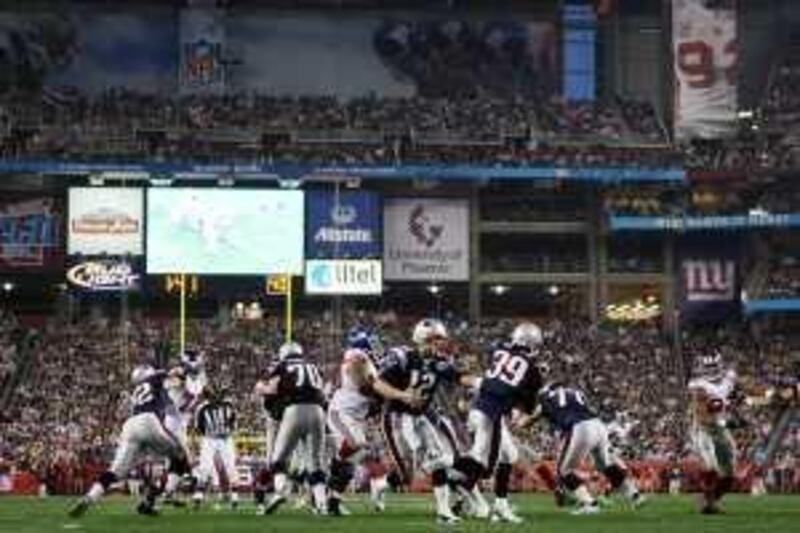The middle-aged worker might be forced to put up with the monkeys for a bit longer, given the tenuous nature of the job market in the US. In previous advertising campaigns for CareerBuilder.com, aired during the Super Bowl, a middle-management Everyman finds himself in the office "cubicle farm" surrounded by apes. These animals plant whoopee cushions in his conference room chair and brush off his suggestions that buying lottery tickets may not be the best way to boost the bottom line. As the monkeys howl with laughter, a voice-over asks: "Want a new job?" The Chicago-based jobs website unveiled the "monkeys" campaign four years ago in one of the most expensive advertising slots in the world: the US National Football League's championship game. The light-hearted approach to finding a new job made sense in a booming economy, and was a hit with viewers. But this year, the chill from Wall Street is being felt on Madison Avenue. A drinks maker is airing a recession-friendly one-second advertisement, while a small clothes manufacturer has proposed dividing the cost of a half-minute spot with 10 other companies. But other executives, fearful that spending millions on a commercial might turn off customers and employees, will be missing this year. "In the ultimate medium where the message is king, being in the game simply sends the wrong message both to employees and other FedEx constituents," says Steve Pacheco, the director of advertising for FedEx, which has bowed out of this year's campaign. The Kentucky-based logistics services company had made 18 appearances since 1989. Another no-show this year is the struggling US car maker General Motors, which had booked advertising slots for 16 straight Super Bowls. In the past 25 years, the adverts during the game have become a cultural phenomenon, sometimes remembered more than the event itself. And with the help of YouTube they have gained a following around the world. That sort of audience does not come cheaply. Today's adverts cost US$3 million (Dh11.01m) for 30 seconds, up from $2.7m last year, making them among the few areas of the US economy where there is inflation. The payoff is exposure to more than 90 million Americans. And that reach is why, despite the worst economic climate in a generation, CareerBuilder.com and other companies believe the price is worth it. For the network broadcasting today's game, Super Bowl advertising spending is a big boost to revenue. In 1967, NBC charged $37,500 per 30-second spot for the first Bowl. Advertising passed the $1m mark in 1995, and hit $2m in 2000. Despite the recession, NBC says more than 90 per cent of the 67 slots have been sold, and that sales compare favourably with those from last year's game. Today, the average cost of a commercial has soared more than 6,000 per cent and is 12 times the rate of the average network's prime time inflation in advertising costs between 1967 and 2004. In the Middle East, the Super Bowl is not quite the money maker it is in the US. The game between the Arizona Cardinals and the Pittsburgh Steelers will be aired live on the Arab Radio and Television (ART) Network and on Tuesday at peak viewing time by Showtime Arabia. Although Showtime Arabia will sell advertising around the game, it is "not at all the same phenomenon that you see in the US", says Marc-Antoine d'Halluin, the president and chief executive at the network. Those joining this year's party in the US include recession-proof drinks makers. In fact, Anheuser-Busch, the beer giant, has bought four-and-a-half minutes this year, 30 seconds more than last year. The online brokerage E-Trade will return with its "Talking Baby" campaign, which featured an infant who spoke like an adult, and told viewers how easy it was to make stock trades. While the company would not reveal details of today's adverts, it said they would reflect consumer sentiment about the economy. The exposure, the company believes, is worth the money. In the week after last year's game, E-Trade reported that the number of newly opened brokerage accounts jumped by 32 per cent. In the three months following last year's Super Bowl, CareerBuilder said job applications jumped by 68 per cent compared with 2007. While the apes are back, this year's slogan will probably feature less monkey business. Last year's promise of "a better job awaits" gives way to advice to help employees "start building" their way to better careers. "We know there are a lot of people out there who are feeling anxious about the job market," says Richard Castellini, the company's chief marketing officer. "We're connecting workers with those opportunities and offering advice, with a wink and a nod." * with agencies and additional reporting by Keach Hagey ashah@thenational.ae
Whole new ballgame
Feature:The chill from Wall Street is being felt on Madison Avenue and Superbowl marketing is likely to be subdued this year.

Editor's picks
More from the national




